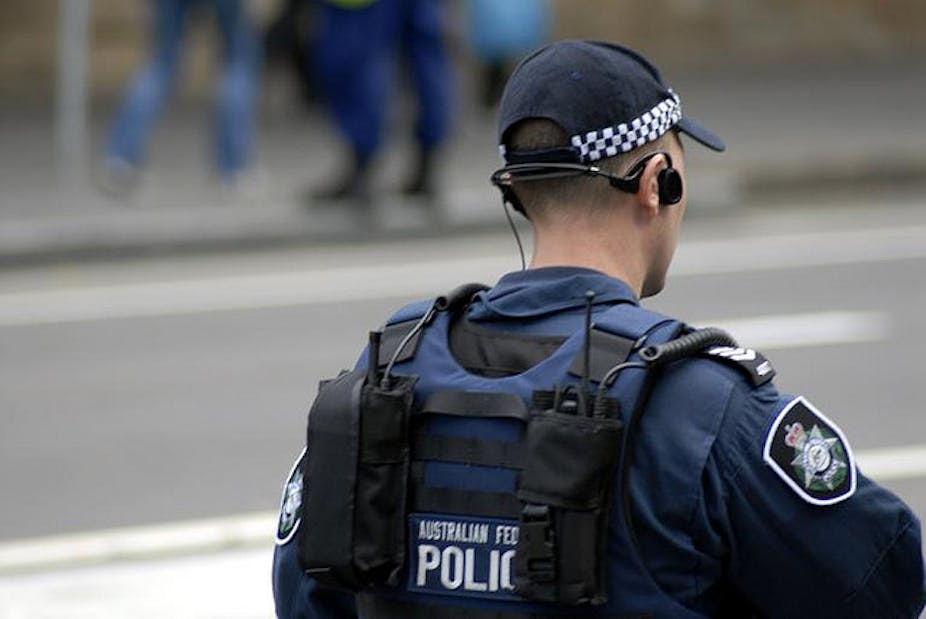More than ten years ago, the Australian public and policymakers overreacted to 9/11 and created a set of laws that went beyond what was needed to protect us against terrorism.
With the recent release of first annual report of the Independent National Security Legislation Monitor by Bret Walker SC, the Gillard government has a golden opportunity to revive debate about our national security legislation.
The Walker report raises some core issues about our counter-terrorism laws. Including whether existing secrecy provisions are too restrictive; whether definitions of membership of a terrorist organisation are extended too broadly; and whether there are features unique to terrorism that can justify the extraordinary treatment of terrorist offences.
There’s a balancing act here. In reviewing Australia’s counter-terrorism laws, the government must strive to maintain public confidence in our national security.
But at the very least, the government should be prepared to re-evaluate, modify and potentially repeal redundant features of Australia’s modern counter-terrorism regime.
Knee-jerk reaction
Regrettably, the Gillard government not only appears indifferent to making fairer laws but also seems largely to have forgotten the international and domestic environment in which many unprecedented terror laws were drafted in the first place.
When these laws were put in place, they were set against a backdrop of knee-jerk legislative amendments, executive bullying and opportunistic political and media exploitation.
It is important to underline that the goal of terrorism, and the presentation of the striking power of such groups, is primarily psychological. After 9/11, an elevated sense of vulnerability and uncertainty is exactly what was acheived, and did play a large role in the shaping our worldviews.
We declared a “war” on an abstract noun. We indulged in xenophobic drama. We invaded countries including Iraq to discover weapons of mass disappearance. We sacrificed age-old civil liberties and domestic political protections against arbitrary government and police actions.
We ignored international law and sanctioned torture as a “necessary evil” for intelligence gathering (although we prefer to call it an “enhanced interrogation technique”). We applauded chest-beating political stage-shows that reinforced a stead-fast commitment to some sort of toughness index.
Climate of fear
Australia has had a long history of being prone to collective panic that is interlocked with evidence of heavy-handed political outcomes. In the aftermath of 9/11, the Australian government again failed to assist in a cogent and balanced response to al-Qaeda.
Instead, it encouraged a universalised notion of existential threat. It carelessly set about to proclaim that the world was now a more dangerous and lethal place – a mindset that somehow forgot a Cold War era characterised by a nuclear stand-off, brutal proxy wars and the logic of “mutually assured destruction”.

Genuine community concerns were too often exploited by policymakers who were themselves highly sensitive to short term political and electoral advantage. A quick political death was envisaged for any individual labelled as “soft” on terror or who might be accused of “coddling” the jihadist adversaries who hated us “because of who we are”. Criticism of the government’s actions was dismissed as “talking like Saddam Hussein”.
Alternatively, sections of the media failed to avoid the lure of alarmist hysterics. For some, terrorism propelled a paranoid state of neighbourhood vigilance and internal suspicion. Some even pointed to the powder kegs of apparently hostile minority groups in warning that “Australian Muslims will have to decide whether they are Australians first”.
Beyond the promotion of crude and counter-productive stereotypes, such scaremongering massively over-exaggerated the strength and appeal of groups such as al-Qaeda.
Emergency thinking
So while it can be argued that some fresh laws were needed, and that security protection did require adjustments to allow a more agile and intelligence-led security apparatus, placing of Australian society into a continuous state of emergency resulted in flawed legislation and defective policy-making.
The rapid, politically-charged and often panic-stricken speed in which specialist terror laws were developed, in part, added to a policy platform that compromised democratic standards and was more conducive to error and over-reach.
Interestingly, based on a poll taken in late 2005, a large number of Australians did express a measure of support for tougher anti-terrorism approaches and offensive security methods.
Such a popular display can be seen as pointing to a demand-led democratic willingness to sacrifice personal privacy for more safety. However, such logic also did coincide with heavily pessimistic outlooks and the fact that seven out of ten people expressed fears that they anticipated a major terrorist incident on Australia soil within two years.
Dissenting voices
The results of the 2004 Australian election, in particular, were the catalyst for the wholesale abandonment of parliamentary convention. Taking advantage of its senate control, the Howard government enforced guillotine motions, took shortcuts in law-making and shut down parliamentary debate.
Interestingly, in October 2005, a 107-page copy of a “draft-in-confidence” version of the Anti-Terrorism Bill (No.2) was posted on the Internet by former ACT Chief Minister Jon Stanhope.
Stanhope refused to remove the confidential document, despite complaints from the Prime Minister’s office. Stanhope stated there was an urgent need to ensure that legislation was not lop-sided or excessive. He called for greater effort to engage more directly with moderate Muslim opinion. He declared that “law of this significance made in this haste can’t be good law”.
Unfortunately, Stanhope’s insistence for a thorough process of informed study and measured public debate to counter misplaced fears provided to be the exception rather than the rule.
It is worth remembering another time when a country was so preoccupied with an evolving and menacing enemy to democracy. The Gillard government should remind itself of former U.S. President Franklin D. Roosevelt declaration that the only thing we have to fear is fear itself.

